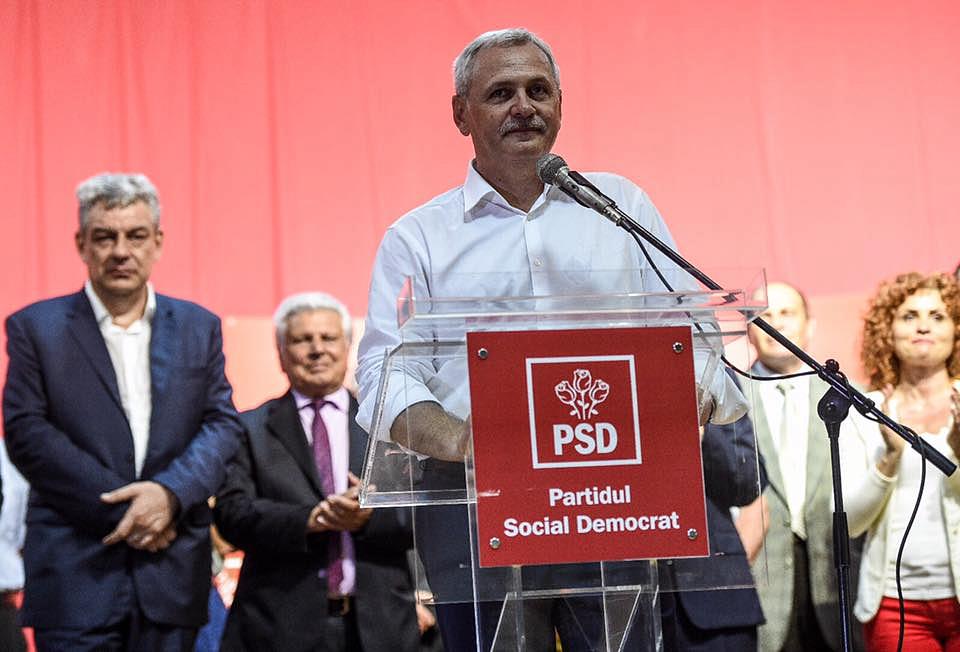Romania’s ruling party is going down in the polls amid internal crises

Romania’s ruling Social Democratic Party (PSD), which won last December’s parliamentary elections with a categorical score of 46%, has lost almost 10 percentage points of the vote intentions since the beginning of this year, according to an IMAS study. On top of this, PSD leader Liviu Dragnea is facing another internal crisis as prime minister Mihai Tudose wants to change some ministers.
The main governing party continues to lead the opinion polls, but only 38.8% of the participants to an IMAS survey said they would vote for PSD in September, down from 49% in January. PSD's drop in the polls is mainly due to two important moments: the adoption of the controversial Emergency Ordinance 13 that would have brought important changes to the criminal code, and the change of the Government led by Sorin Grindeanu, sociologist Alin Teodorescu said at local TV station Digi24.
The Emergency Ordinance 13, which triggered massive street protests in Romania, cost PSD 1 million voters. Moreover, the change of former Prime Minister Sorin Grindeanu cut another 0.5 million voters from PSD’s list, according to Teodorescu. The ruling party's decline may continue in the next year.
Meanwhile, the main opposition party PNL (National Liberal Party) has gone up in the polls from 20.7% in January to 30.9% in September, benefiting from PSD's erosion.
PSD’s junior partner in the ruling coalition ALDR (the Alliance of Liberals and Democrats for Europe), led by former PM Calin Popescu Tariceanu, also more popular among voters. A total of 6.8% would have voted for ALDE in January, the figure going up to 8.1% in September.
The other important opposition party USR (Save Romania Union), which came third in last year's elections, has also lost some of its supporters, going down from 8.3% to 6.8% of the vote intentions from January to September. This was mainly due to the internal scandals and founder Nicusor Dan's decision to leave the party.
The same survey, which was carried out in September on 1,000 respondents, shows that the Romanians have more confidence in the current Prime Minister Mihai Tudose than in PSD president Liviu Dragnea. While the level of trust in Tudose dropped slightly from 24.7% to 23.2%, the figure almost halved in Dragnea’s case, going down from 31.5% to only 18.7%. Meanwhile, the level of trust in President Klaus Iohannis went up from 32% to almost 42%.
The governing Social Democratic Party (PSD) is again faced with internal tensions between the prime minister and the party leader, three months after having changed the previous PM. The ruling party organized a meeting on Tuesday, October 10, after PM Tudose announced during a talk show at local TV station Antena 3 that he planned to change some of the ministers in his cabinet this week. He also said that his relationship with PSD leader Liviu Dragnea was not “in a happy moment”.
According to the local media, the ministers targeted by the reshuffle are deputy prime minister and regional development minister Sevil Shhaideh, EU funds minister Rovana Plumb, and the minister for the relation with the Parliament Viorel Ilie. All three of them are targeted by investigations of the National Anticorruption Directorate (DNA).
However, Tudose and Dragnea didn’t reveal the names of the ministers to be changed after the meeting. They said that a decision would be made on Thursday, October 12, during the meeting of the party’s Executive Committee. The same meeting should decide if the party grants more freedom to the Government to take decisions.
According to information presented by local Digi24, the Prime Minister told Dragnea that he would resign if the party did not accept the government reshuffle. On the other hand, several Social-Democrat leaders allegedly asked Mihai Tudose not to resign.
The tensions between Tudose and Dragnea appeared after a recent opinion poll released by a local research institute showed that the people’s confidence in the cabinet led by Mihai Tudose has plunged dramatically over the past month while the governing party PSD has maintained its confidence quota. The Prime Minister suspected that PSD ordered the poll in order to get rid of him, something that Dragnea denied on Monday.
Mihai Tudose took over as Prime Minister in late June this year, after the governing coalition overthrew its own Government led by Sorin Grindeanu through a no-confidence motion.
The tensions between the Tudose and Dragnea may also be linked to the Government's reluctance in supporting some of the changes initiated by the PSD leader. The PM has already backed down from supporting the VAT split implementation for all companies starting January 2018.
Mihai Tudose may also be reluctant in promoting the changes to the justice laws proposed by justice minister Tudorel Toader and embraced by the coalition leaders, according to some local media. The changes to the justice laws have been intensely debated over the past weeks due to the intention to impose political control over the judiciary by transferring the Judicial Inspection under the Justice Ministry's authority.
Romanian Ministry publishes draft project to amend Justice Laws
Irina Marica, irina.marica@romania-insider.com
(photo source: Liviu Dragnea on Facebook)












